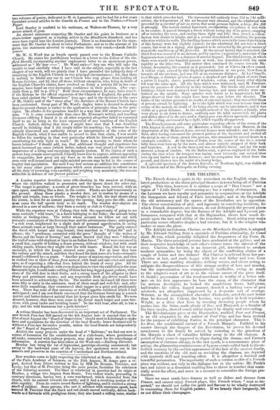THE THEATRES.
The French drama is again in the ascendant on the English stage; the latest productions at the three principal theatres in town being all of Parisian origin. This time, however, it is neither a corps of " Don Ctesars " nor a legion of "Little Devils" overrunning us; but a variety of characters. At the Lyceum we have royalty and peasantry in conjunction; at the Adelphi the bourgeoisie and felonry of Paris intermingle; and at the Haymarket the old aristocracy and the spawn of the Revolution are in opposition. The clever construction of plot, and ingenuity in contriving incidents, for which French dramatists are famous, do not distinguish the present pieces he a -remarkable degree; but the flatness of the Adelphi and Lyceum per- formances, compared with that at the Haymarket, shows how much de- pends upon the tact and ability of the translator. Good acting may make particular scenes effective despite a bad version; but it is the adapter who makes or mars the piece. The Adelphi melodrama, Clarisse, or the Merchant's Daughter, is adapted by Mr. Edward Stirling, from a spectacle of Parisian criminality, Le Canal Saint Martin, which probably delighted the frequenters of the Porto St. Martin. The three principal persons have graduated at the gallics; and on their respective knowledge of each other's crimes turns the interest of the story. Clarisse, the heroine, is an innocent girl, introduced to awaken tenderer sympathies by being the object of the conflicting claims of a couple of lovers and two fathers! But Clarisse is relieved from her per- plexities at last, and made lmppy with her real father and true lover There are some startling situations, striking scenes, and clever acting, to mitigate the disagreeableness of this strange medley of love and murder, but the representation was comparatively ineffective, owing as much to the adapter's want of art as to the vicious nature of the piece itself. 0. Smith's personation of the wood-merchant is worthy of a better sub- ject: on his first appearance he bore the stamp of the character that his actions developed; he looked the amphibious brute, half-pirate, half-trader; his sullen, dogged manner, denoted a lurking sense of past misdeeds, not altogether suppressed by a desperate sort of courage. Webster, as the accomplished chevalier d'industrie, acted the part better than he dressed it: Celeste, the heroine, was perfect in both requisites: Wright, as a diver that lives by rescuing drowning people whom be pushes into the Seine, made plenty of fun; and Munyard, as a burglar of the tiger species, showed comic talent injured by display and over-acting. The Revolutionary piece at the Haymarket, entitled Past and Present, is an old adaptation by the author of Paul Pry; and has been revived for the purpose of exhibiting Farren in the principal character. This is La Rose, the confidential servant of a French Marquis. Faithful to his master through the dangers of the Revolution, he proves his devoted attachment to the family he served by restoring to the grandson of the Marquis a chest of valuables hidden away in the old chateau. A period of forty years is supposed to elapse during the drama; and Farren's assumption of extreme old age, in the last epoch, is a consummate piece of acting: the glimmering reminiscences of bygone events called back to his en- feebled memory by the sudden appearance of the heir of the ancient family, and the emotions of the old man on revisiting the chateau, are depicted with masterly skill and touching effect. It is altogether a finished and beautiful personation. The superiority of such a version as this of a French piece was evident, not only in the dialogue but in the action: Mr. Poole's tact and talent as a dramatist enabling him to throw in touches that mate- rially assist the effect, and serve in a manner to naturalize the foreign pro- duction.
Since we must needs have dramas as well as dishes and dresses from France, and cannot enjoy French plays, like French wines, "neat as im- ported," we should not suffer the spirit and flavour to be wholly destroyed in concocting them for English palates. If we brandy their burgundy, let US not dilute their champagne.


























 Previous page
Previous page